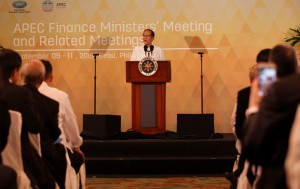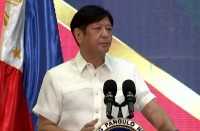
(Eagle News) — President Aquino on Thursday (Sept. 10) told finance ministers attending the Asia Pacific Economic Conference (APEC) in Cebu province of the Philippine experience in mounting an economic turn-around that the government under his watch was able to do, and equated this to the promise of economic prosperity that APEC brings.
Addressing the start of the two-day APEC Finance Ministers Meeting at the Shangrila Hotel in Lapu-Lapu City, Cebu, the President boasted of his administration’s achievements wherein he said the country was able to climb multiple measures of global competitiveness since 2010.
“We have gone from 85th to 52nd in the World Economic Forum’s Global Competitiveness Index, from 144th to 95th in the World Bank’s Ease of Doing Business Report, amongst many other indices. Naturally, the global community has taken notice that in empirical terms—and in terms of self-confidence—the Philippines is stable, able, and resilient,” Aquino said.
At the start of his speech, the President again touched on the problems encountered at the start of his administration, and once again hit at his predecessors in government.
“A little more than five years and two months ago, I took my oath as President of the Philippines. From the very beginning, we knew that tremendous challenges awaited us. We quickly realized, however, that we had severely underestimated how much the patronage and corruption of the past had undermined our institutions. Every day, it seemed, we uncovered issues that had festered during my predecessor’s term. At that point, many of us could not help but long for the weekend, if only for a temporary respite from the problems bequeathed to us,” he said.
The President said that this situation did not daunt his administration in implementing economic and political reforms, including running after officials who had allegedly “committed wrongdoing.”
“Our resolve began to reap results much faster than expected. One look at the figures tells a complete story: From 2010 to 2014, we posted a GDP growth rate of 6.2%, which marks the fastest period of economic growth for our country in four decades; and we believe the macroeconomic fundamentals are in place for us to continue, if not improve on, this performance,” he said.
“During our administration alone, the Philippines received 22 positive credit rating actions. The most prominent among these occurred in 2013, when the world’s most prominent credit ratings agencies unanimously declared the Philippines’ investment grade. On top of this, the Philippines’ credit default swaps have remained one of the lowest in the region,” Aquino explained.
The President told finance ministers in the Asia Pacific Region that he had to recount the “Philippine story” to stress the goal of APEC, and to illustrate how achieving economic gains can happen with a “unified sense of purpose.”
“My positivity is reinforced by the Cebu Action Plan—named after one of the most progressive provinces in our nation—to which our economies are committing. I am told that it ticks all the right boxes: better financial integration among APEC members fosters an environment ripe for investment; greater transparency as regards government funds maximizes efficiencies—and more importantly—the benefits enjoyed by our peoples; and a renewed commitment to improve and finance infrastructure that will lay the necessary foundations for continued growth. Not to mention, the Cebu Action Plan will also help equip us to respond to some of the gravest threats to our economies in the form of natural disasters, particularly those caused by the new normal of climate change,” Aquino told the finance ministers’ meeting.
The Cebu Action Plan or CAP is set to be launched on Friday, Sept. 11, after the APEC finance ministers’ meeting.
In November, leaders of the APEC economies will be coming to the country to attend the APEC Leaders’ Summit.
It will be the Philippines’ second time to host the APEC Summit, the first was in 1996 during the term of then President Fidel Ramos.
Almost two decades later, Manila will again be the proud host of the APEC Summit, this time with 21 heads of state attending the conference.
“Two months from now, I will be welcoming the leaders of APEC economies to discuss clearer pathways for us to build more inclusive economies, towards building a better world,” President Aquino said in his speech.
“The success of that meeting, however, is rooted in gatherings such as this, where the more technical aspects are forged into policies that public servants can carry out for the benefit of our countrymen,” he said.
The four pillars of CAP are: financial integration, fiscal reforms and transparency, financial resilience and infrastructure development and financing.
Under the Philippines’ leadership, the overall subject of APEC 2015 is the promotion and advancement of inclusive growth in the Asia-Pacific region, hence the APEC 2015 theme, “Building Inclusive Economies, Building a Better World.”







